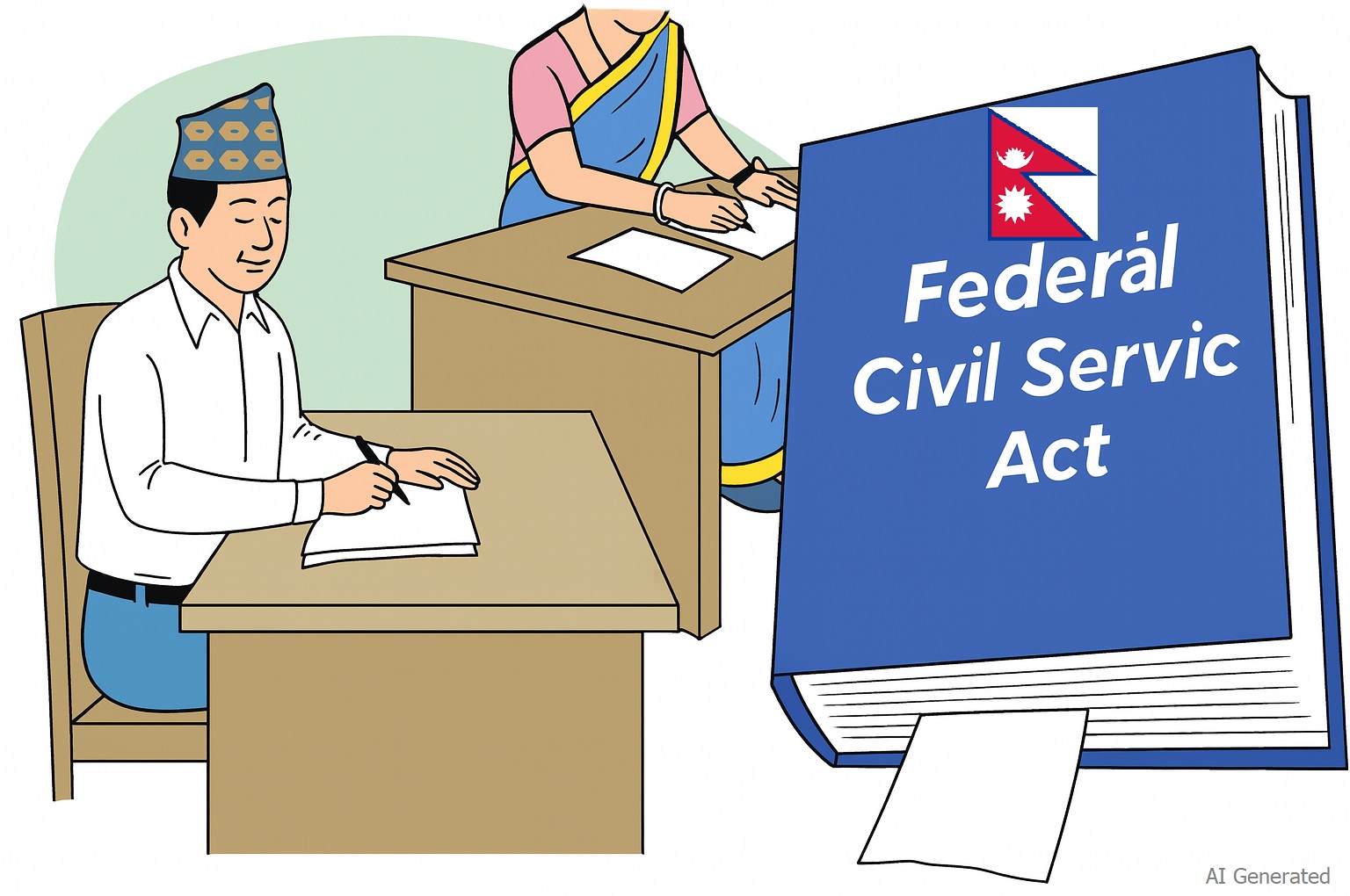
Federal Civil Service Bill 2080 Passed by the House of Representatives
The Federal Civil Service Bill 2080 has been passed by a majority in the House of Representatives.
In Sunday’s meeting, Minister for Federal Affairs and General Administration Rajkumar Gupta proposed the discussion of the bill along with the report submitted by the State Affairs and Good Governance Committee.
After responding to questions raised during the discussion, the proposal to pass the Federal Civil Service Bill 2080 was tabled. With a majority of members agreeing, Speaker Devraj Ghimire declared the bill passed.
Speaker Ghimire remarked that the bill represents a historical and policy-defining legal step for the effective implementation of federalism.
The bill was registered in the House of Representatives in Falgun 2080 and passed after 15 months.
The State Affairs Committee made several key amendments after detailed deliberation.
Entry Age into Federal Civil Service
-
The entry age for men will remain at 35 years.
-
The entry age for women has been set at 39 years.
-
The government had proposed 32 years for men and 37 for women.
-
Previously, women could enter at 40 years, but this posed problems in completing the 20-year minimum service required for pension. Hence, 39 was fixed.
Retirement Age
-
The retirement age is revised to 60 years.
-
It will be implemented gradually:
-
First year: 58 years
-
Second year: 59 years
-
From the third year: 60 years
-
-
This phased plan allows the Public Service Commission to manage new recruitments.
Removal of Open Competition for Joint Secretary
-
Open competition for joint secretary positions has been discontinued.
-
Previously, 10% of joint secretaries were appointed through open competition.
-
Now, only second and third-class gazetted officers and first-class assistants will be recruited via open competition.
-
100% of assistant (Kharidar) posts will be filled through open competition.
-
Section officers will be recruited through 60% open competition, as per the revised provision (was previously 70%).
New Position: Additional Secretary
-
A new post called Additional Secretary has been introduced.
-
Positioned below Secretary and above Joint Secretary (13th level special class).
-
To create this post, a reduction must be made in the posts of Secretary or Joint Secretary.
-
This is expected to eliminate dual-secretary arrangements in some ministries.
-
Additional Secretaries will lead departments in place of junior Joint Secretaries to avoid internal conflicts.
Cooling-Off Period
-
Civil servants who resign or retire must wait 2 years before taking diplomatic or constitutional appointments.
-
This clause, called the "cooling-off period," was opposed by secretaries but endorsed by lawmakers to prevent undue coordination between ministers and secretaries.
Service Tenure of Chief Secretary and Secretaries
-
Chief Secretary's tenure has been reduced from 3 years to 2 years.
-
Secretaries' tenure reduced from 5 to 4 years.
-
However, current officials will continue under the existing term limits.
Inter-Province Transfers for Local and Provincial Staff
-
Employees at the local and provincial levels can now be transferred across provinces after 10 years.
-
This requires agreement between the Chief Ministers’ Offices of the respective provinces.
Transfer Regulations
-
A minimum of one year must pass before an employee is eligible for transfer.
-
Transfer schedules must be fixed annually by the concerned authority.
-
Transfers will be rotational based on geographical classification (Ka, Kha, Ga, Gha zones).
-
Employees in ‘Gha’ areas must mandatorily serve in ‘Ka’ areas next.
-
This aims to stop random transfers and ensures deployment in remote regions.
Reservation System Reform
-
Individuals can use reservation once for gazetted and once for non-gazetted posts.
-
If a reserved quota is unfilled, it will be allocated to the least represented group.
-
For example, if the Dalit quota remains unfilled, it will be filled by Tharu or Muslim candidates.
-
After one such appointment, no new post will be advertised for that group the following year.
-
This ensures timely fulfillment of reserved positions.
Posting of Federal Staff in Local and Provincial Levels
-
Federal staff can serve in provincial or local levels for a maximum of 10 years.
-
Currently, federal employees hold positions from Chief Administrative Officer to Provincial Secretary.
-
After ten years, provinces must recruit independently through open competition.
Internal Tourism Leave
-
Legal provision introduced for internal tourism leave for civil servants.
-
Previously, this was managed only through regulations.
Trade Union Rights
-
Despite new provisions, trade union rights for civil servants remain unchanged.
-
Though several voices opposed this, the committee did not make changes.
All these provisions have been incorporated into the bill.
The bill passed by the House of Representatives will now be sent to the National Assembly. The National Assembly must pass it within two months. Once passed, the Speaker will certify it, and it will be authenticated by the President to be enacted.
Secretaries are reportedly lobbying for the bill to be passed before the end of Asar.


